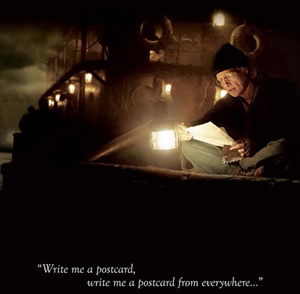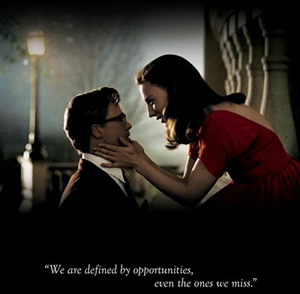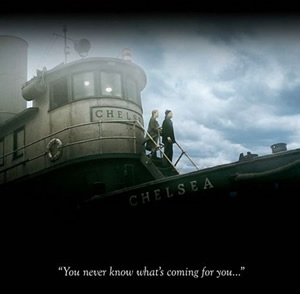Movies

New Releases • A-D • E-H • I-P • Q-Z • Articles • Festivals • Interviews • Dark Knight • Indiana Jones • John Wick • MCU
The Curious Case of Benjamin Button
Directed by David Fincher
Rated PG-13
The Curious Case of Benjamin Button turns into one of the year's biggest disappointments as its third act devolves into a sham of insincere pop philosophy.
The Curious Story

Born in 1918 on the night World War I ended, Benjamin Button was a curious case indeed. His mother died after his birth and his father abandoned him on the steps of a nursing home.
Benjamin was born with arthritis. He was deaf. He was a baby in an old-man's shriveled body. Those weren't the cute, dimply shrivels of a newborn. The infant had all the maladies and appearance of age, but in a tiny baby's body.
An obscure subplot about a blind man who created a clock that ran backwards attempts to create a sense of extremely bizarre happenstance, but how the installation of that clock in a New Orleans train station and the child's birth could be interconnected is never given its due, other than to say the baby was born "under unusual circumstances."
There's no real symbiosis between the two. Years after Button's demise, the clock finally gets replaced, following 84 years of disservice, with a spiffy, forward-moving digital model.
Well, that whole clock bit is ridiculous and beside the point. Benjamin Button is based on a short story F. Scott Fitzgerald included in his Tales of the Jazz Age compilation back in 1922. Suffice it to say that most of what may or may not have worked in his story 86 years ago doesn't work now, at least not as it's presented by director David Fincher (Zodiac).
The Curious Screenplay
Benjamin is reared by a black woman who was at one point told she was barren and would never be able to give birth. As Benjamin's time on Earth continues, he appears younger and healthier. Thanks to a holy roller in a tent revival, 7-year-old Benjamin (looking 70 and wheelchair-bound) is healed and finally takes his first steps. Roughly midway through this overlong epic, Benjamin's looking mighty fine to all the ladies. He is, after all, played by Brad Pitt (Fight Club).
The telling of Benjamin Button's story revolves around a woman named Daisy (Cate Blanchett, Indiana Jones and the Kingdom of the Crystal Skull), who's on her deathbed in a New Orleans hospital. Her daughter (Julia Ormond, Surveillance) reads to her from Benjamin's diary. Outside, Hurricane Katrina's beginning to strike.
Such a set up allows for loads of flashbacks and flashbacks within flashbacks, as well as a multi-layered, multi-textured storyline, but it simply doesn't gel together.
In some respects, Benjamin Button feels like The English Patient. In other ways, it's a lot like Forrest Gump. Unfortunately, The Curious Case of Benjamin Button fails to convey the complex blend of culture and art mixed with obsession and tragedy as found in the former and the wonderful joie de vivre found in the latter.
And many comparisons to Forrest Gump are most certainly warranted. Both titular characters live incomparable lives, but more significantly both movies have screenplays written by Eric Roth. Swap out Gump's Captain Dan for Button's Captain Mike and continue to swap out this for that, particularly their life-long romances – Gump's Jenny for Button's Daisy.
The Curious Movie
It's clear The Curious Case of Benjamin Button is a passion project for its director and star. It's admirable what they're trying to accomplish here. The ambitions are obvious, but ultimately it's a shame it isn't more moving. In fact, the most curious thing about Benjamin Button is how lifeless this "life affirming" movie turns out to be.



Poster art: Warner Bros.
Couple this with Slumdog Millionaire and the result would be one of the most depressing double-features of "feel good" movies ever assembled. But maybe that's just a sign of the times, particularly in a year when The Dark Knight offers greater oomph and sense of hope in its final frames than either Button or Millionaire.
The pacing of this mostly humorless rumination on life – more precisely, death – attempts to be too stately, too elegant for its own good.
Giving credit where credit is due, Benjamin Button is always interesting to look at and most of the special effects work is truly marvelous. The movie is chock full of Fincher's flair for imagery and it's definitely one of those big-budget movies where the money is well spent in terms of production values.
But Button is undermined by too many extravagant leaps of faith and logic to really resonate at the fundamental, human level it so desperately wants to touch. To that end, the two most significant relationships in the movie – between the old Button and the young Daisy and the elderly Daisy and her daughter – ring hollow.
The Curious Inconsistency
Benjamin Button collapses in the third act, falling apart under the weight of its pretensions and failing to realize its bottom-line conceit – that people are born into diapers and wind up dying in diapers – is really not an awe-inducing revelation. It's not. It's really not, guys.
At one point in their blustery, on-and-off romance, Daisy asks Benjamin, "Will you love me when my face gets old and saggy?" Benjamin replies with his own question, "Will you love me when I get acne?"
That's actually a cute little moment of genuine humor, a rarity in this movie. Shortly after, the movie proceeds to run itself off a cliff.
At one particularly significant turning point in the narrative, Benjamin takes off, afraid of people seeing him "growing young." Traveling the world, exploring and carrying on all sorts of spiritual adventures in India, Benjamin ratchets up the schmaltzometer with a series of postcards to home, writing about how he wishes he could've done this, that and the other thing. The real problem? Most of it is self-inflicted emotional misery.
"Be who you want to be, there are no rules in life," he writes. "Make the best of it. If you fail, start over again."
Or do as he does – run away from your circumstances. It doesn't get any phonier than preaching one thing and then doing the exact opposite.
That's when the movie finally reveals its hand, which turns out to be a very cloying, ham-handed handling of Button's devolution back down to infancy. The only thing to really weep about is when that crazy, old backward motion clock gets washed away by Katrina. There's a nagging desire to find that strange blind man's clock and have it reinstalled in a vain hope to get back the three hours spent watching this shallow, artificial movie.
• Originally published at MovieHabit.com.


